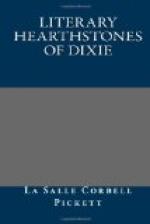The Professor of Latin in the Virginia Military Institute was Major J.T.L. Preston, grandson of Edmund Randolph. He was a man of great dignity of character and manner and of unusual scholarship. Though Margaret Junkin had at times requested her nearest of kin to seclude her in an asylum for the insane should she ever manifest a tendency to marry a widower with children, she proceeded quite calmly and with reason apparently unclouded, to fall in love with and marry Professor Preston, notwithstanding his possession of seven charming and amiable sons and daughters left over from a former congenial marriage. She proved a most devoted mother to her large family, who returned her affection in full measure. A volume of her poetry is dedicated to her eldest stepdaughter who, after the death of Margaret, was her most loving and appreciative biographer. To her great sorrow, one of the sons was killed in battle.
The marriage was followed by a visit to “Oakland” on the James River, the home of Major Preston’s sister, Mrs. William Armstead Cocke, where at first the ornately dignified style of living rather dazed the bride accustomed as she had been to the simplicity of a home in which the only luxury was in giving help to others. Colonel William C. Preston, the eloquent South Carolina orator, met the “little red-headed Yankee” with distinct aversion to her “want of style and presence,” but was soon heard to declare with enthusiastic admiration that she was “an encyclopedia in small print.” Here among ancestral trees she found inspiration and in the society of her new sister she enjoyed the most delightful soul companionship.
In the early years of her married life writing was laid aside while she devoted herself to the care of her family, the entertainment of the many visitors who came to the Preston house and the beautification of her new home, finding plenty of space in the attractive house and extensive grounds with their noble trees, orchard, garden and meadow for the outlet of all her imagination. In this ideal home she was living her peaceful and happy life when the bugle call destroyed the serenity of the country. She suffered one of her greatest sorrows in the difference of political opinion between her Northern father and her Southern husband. The latter, holding that while secession was unwise, coercion was tyranny, followed Virginia when she cast in her lot with the seceding States. Dr. Junkin and his widowed youngest daughter, Julia, returned to Philadelphia, while Colonel Preston joined Stonewall Jackson’s army.
Margaret Preston’s worship of the muses was woven in with her devotion to the household goddesses, and in her journal the receiving of the first copy of her new volume of poems is sandwiched in between the making of twenty-two gallons of blackberry wine and thirty-three bottles of ketchup. House-cleaning and “Tintoretto”; pickles and “Mona Lisa”; hearth-painting and “Bacharach wine” were all closely connected in her every-day experience. From a ride through the blue hills she would return with a poem singing in her heart, radiant with sun, shaded with the mists of the darkening heights, and when it had bubbled over in laughter and dreams and tears and was safe upon the written page, she would go into the kitchen and produce such marvels of cookery as made her a housewife of more than local fame.




